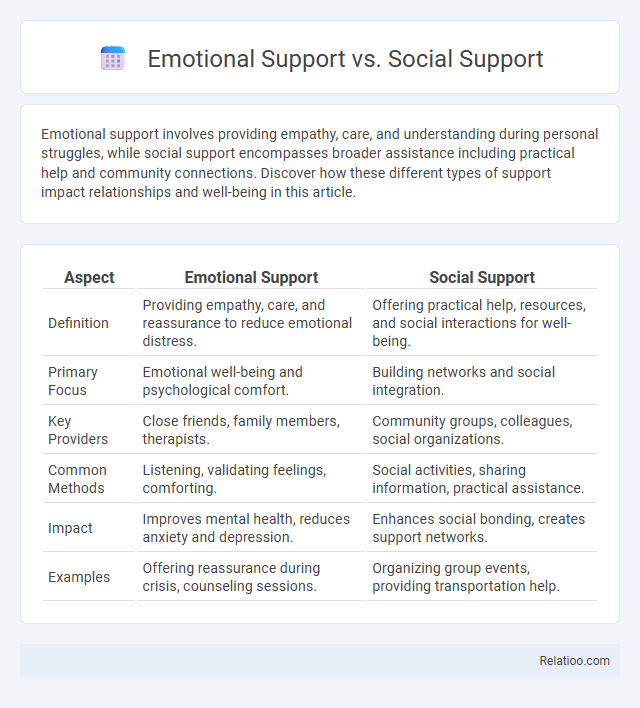Emotional support involves providing empathy, care, and understanding during personal struggles, while social support encompasses broader assistance including practical help and community connections. Discover how these different types of support impact relationships and well-being in this article.
Table of Comparison
| Aspect | Emotional Support | Social Support |
|---|---|---|
| Definition | Providing empathy, care, and reassurance to reduce emotional distress. | Offering practical help, resources, and social interactions for well-being. |
| Primary Focus | Emotional well-being and psychological comfort. | Building networks and social integration. |
| Key Providers | Close friends, family members, therapists. | Community groups, colleagues, social organizations. |
| Common Methods | Listening, validating feelings, comforting. | Social activities, sharing information, practical assistance. |
| Impact | Improves mental health, reduces anxiety and depression. | Enhances social bonding, creates support networks. |
| Examples | Offering reassurance during crisis, counseling sessions. | Organizing group events, providing transportation help. |
Introduction to Emotional and Social Support
Emotional support involves providing empathy, care, and reassurance to help individuals manage stress and improve mental health, often delivered through close relationships such as family and friends. Social support encompasses a broader range of assistance, including emotional, informational, and practical aid, contributing to overall well-being and resilience. Bridging social support refers to connections between diverse social groups that facilitate access to new resources and opportunities, enhancing social integration and community cohesion.
Defining Emotional Support
Emotional support involves providing empathy, care, and reassurance to help individuals cope with stress and emotional challenges. Social support encompasses a broader network of practical assistance, companionship, and shared resources that improve overall well-being. Understanding the distinctions between emotional support, social support, and bridging connections helps you effectively address specific personal or community needs.
Defining Social Support
Social support encompasses various forms of assistance provided through relationships, including emotional support, which offers empathy and understanding, and bridging support, which connects individuals to broader networks and resources. Defining social support involves recognizing these multidimensional interactions that promote psychological well-being, resilience, and access to information. Effective social support systems enhance coping mechanisms and improve mental health outcomes by fostering a sense of belonging and resource availability.
Key Differences Between Emotional and Social Support
Emotional support involves providing empathy, care, and reassurance directly addressing Your feelings and mental well-being, while social support primarily encompasses practical assistance, sharing resources, and fostering social connections. Bridging social capital refers to connections that link diverse social groups, facilitating access to new information and opportunities beyond one's immediate circle. Emotional support strengthens individual resilience through close, intimate relationships, whereas social support enhances broader network integration and resource sharing.
Benefits of Emotional Support
Emotional support provides your mental well-being with empathy, validation, and reassurance, which significantly reduces stress and anxiety. Unlike social support networks that offer practical help or bridging connections that link different groups, emotional support nurtures personal resilience and deepens relational trust. This type of support is crucial in fostering emotional stability and enhancing overall psychological health.
Benefits of Social Support
Social support provides essential psychological benefits such as reducing stress, enhancing emotional well-being, and promoting resilience in challenging situations. It fosters a sense of belonging and connectedness, which can improve mental health outcomes and reduce feelings of loneliness and depression. Unlike emotional support that primarily addresses personal feelings, social support involves a broader network of relationships offering practical assistance, resource sharing, and community integration.
Situations Requiring Emotional Support
Situations requiring emotional support often involve personal crises such as grief, trauma, or significant life changes where empathy and understanding are crucial for coping. Emotional support provides comfort and validation through active listening and reassurance, distinguishing it from social support, which includes broader practical assistance and resource sharing. Bridging social capital connects individuals across diverse networks to access new information and opportunities but may lack the intimate empathy needed during intense emotional distress.
Situations Requiring Social Support
Situations requiring social support often involve emotional distress, practical challenges, or health crises where individuals need reassurance, assistance, or connection. Emotional support provides comfort through empathy and understanding, addressing psychological needs and reducing feelings of isolation. Bridging support connects individuals to broader networks and resources, facilitating access to new opportunities and enhancing social integration beyond immediate emotional and practical aid.
Integrating Emotional and Social Support in Daily Life
Integrating emotional and social support in daily life enhances your overall well-being by combining empathy and meaningful connections that foster resilience and reduce stress. Emotional support involves providing comfort and understanding during challenging times, while social support emphasizes practical help and companionship within your community or network. Bridging these supports creates a balanced support system, enabling you to navigate life's complexities with both emotional reassurance and tangible assistance.
Conclusion: Choosing the Right Support
Understanding the differences between emotional support, social support, and bridging is crucial for your well-being and growth. Emotional support provides empathy and reassurance during tough times; social support offers practical assistance and companionship within your immediate network; bridging connects you to new resources and communities beyond your existing relationships. Choosing the right type of support depends on your specific needs, with emotional support addressing personal feelings, social support enhancing daily interactions, and bridging enabling broader opportunities and perspectives.

Infographic: Emotional Support vs Social Support
 relatioo.com
relatioo.com